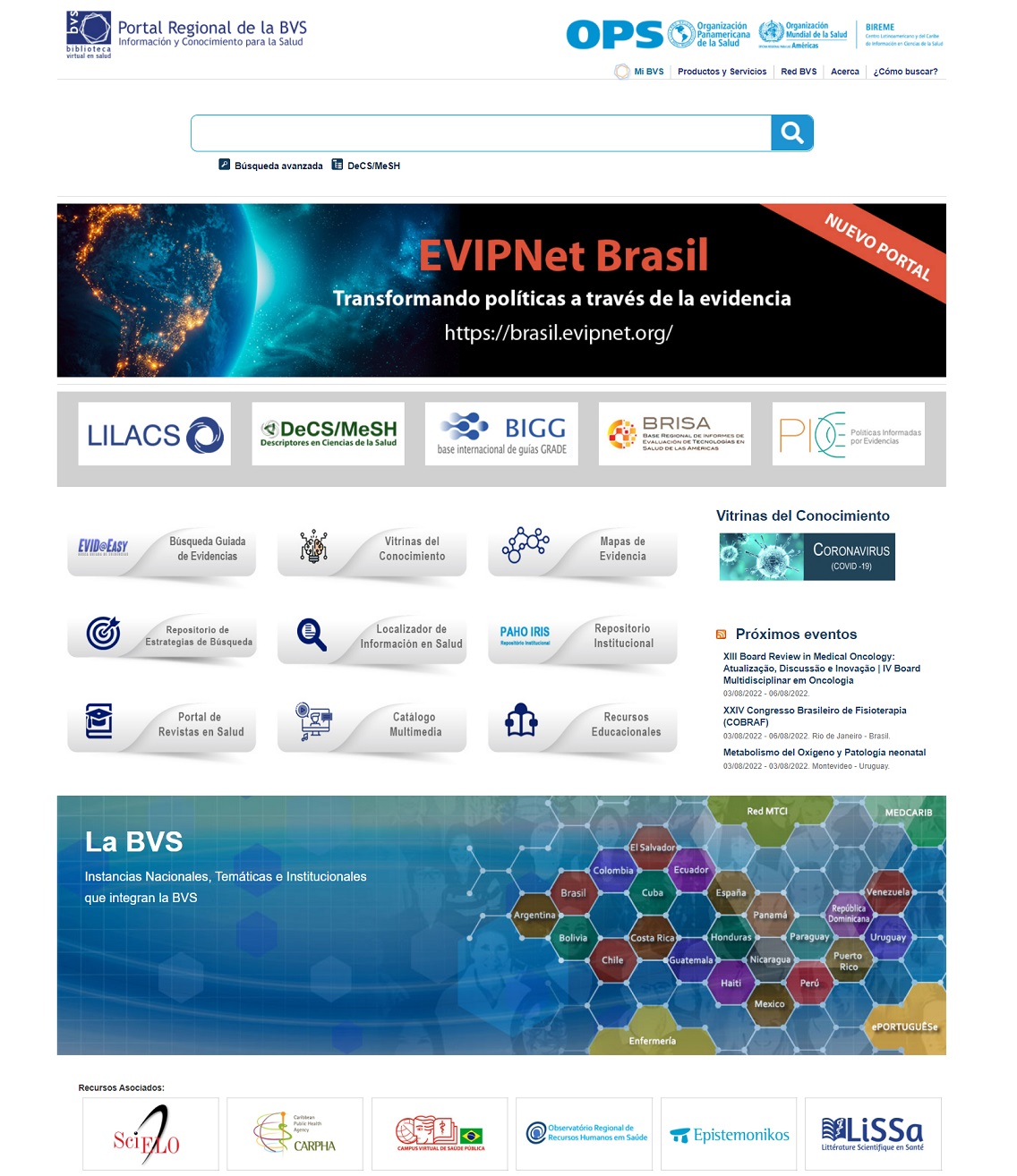
The first semester of 2022 was characterized by important results by BIREME/PAHO/WHO, which continues to support the countries of the Region with information and evidence for decision-making in health in the context of its Biennial Work Plan 2022-2023 (PTB 22-23) made up of more than 50 information projects/products and services grouped into four initiatives: Information and Knowledge Management, Information Services, Information Intelligence in Health Sciences, and BIREME Leadership and Management.
At the end of each semester, the Organization at its different levels, that is, Areas and Departments of the Central Office, Country Offices and Centers, evaluate and reflect on their results and performance in the context of their ongoing biannual work plan (BWP), therefore, the one referring to the 1st semester of 2022 of BWP 22-23, when BIREME considered its main results in the context of its management and operation, and the implementation of its technical cooperation program:
Management and Operation
Operations and their continued strengthening and also of BIREME’s technical cooperation products and services through the following conventions, agreements and actions subsidized with financial resources:
- Coordinated actions with PAHO/WHO, PAHO Brazil and the Government of Brazil for the signing of the BIREME Headquarters Agreement in the country;
- Extension of the TA3/TC93 for 5 years (2022-2027) for the maintenance of BIREME;
- Formalization of the TA4/TC93 for the development of the Virtual Library on Indigenous Health (VHL Indigenous Health); and
- Developments in the context of TC95, in coordination with PAHO Brazil, for the priorities of information management and institutional strengthening of the Executive Secretariat (via the CGDI/SAA) of MINSAL and with validity extended until August 2025.
Effective management of BIREME operations even in emergency teleworking due to the COVID-19 pandemic with internal and external communication actions, IT infrastructure, operation of services, servers and ICT platforms, and maintenance of regular actions for the development of skills and strengthening of the organizational climate.
Technical Cooperation
- The regional portal of the VHL with access to 53 sources of information totaling about 34 million records had about 11 million access sessions from 7 million users, with about 28 million page views;
- LILACS continues to be updated as the main index of scientific and technical production in LA&C. The LILACS Network contributed 16,213 new records, and LILACS reached 1 million document records (the majority are journal articles), and about 58% linked to the full text;
- The 2022 version of the DeCS/MeSH is published, with the new MTCI category and the revision of the Public Health category. The DeCS/MeSH Finder service was used by more than 44,000 users from 99 countries, searching its texts more than 236,000 times. The 10 countries that used the most are Brazil, the United States, Mexico, Cuba, Peru, Colombia, Portugal, Spain, Argentina and Ecuador;
- The 2022 calendar of meetings to strengthen and expand networking includes 35 online sessions. 16 sessions were held, with an average of 110 participants per session, more than 1600 participants from 21 countries;
- The Reference Network (RefNet) training sessions were integrated with the Indexers Network. The user service answered 522 questions through the Ask the Librarian service, 83 new search strategies developed and 19 updated. RefNet has 157 members from 15 countries. The search strategies repository reached 829 registered searches;
- Alliances and actions at the global level, mainly with projects in coordination with the WHO Library and Digital Information Networks Unit: (i) base “COVID-19 – Global literature on coronavirus disease” with more than 622 thousand documents and accessed by more than 4.1 million users; (ii) Global Index Medicus (GIM) integrating the Indexes Medici coordinated by the Regional Offices of the World Health Organization (WHO) with more than 2.3 billion bibliographic references in health and accessed by more than 530 thousand users; (iii) operation of the AFRO/WHO Index Medicus on the VHL’s technological platform; (iv) support in the use of the ProEthos platform, developed by BIREME in coordination with the PAHO Regional Bioethics/HSS team, to systematize the work processes of the Human Research Ethics Committees. Based on the ProEthos platform, the Good Practices Platform was developed to record actions related to the SDGs (Sustainable Development Goals);
- Maintenance of the e-BlueInfo version 2.0 App, with new document collections and functionalities such as the option to store favorite and visited documents (through authentication). Brazil, Peru, Guatemala, El Salvador, Paraguay, and Colombia make up the e-BlueInfo network with more than 16,000 downloads of the application. Downloads from other countries number more than 2,000; and
- Continuous updating of EVID@Easy with the improvement of guided searches. New Evidence Maps and 20 Windows of Knowledge on the emerging topics and dates of the health calendar were developed and updated, and the Evidence Maps and Windows portals were published.
There are also two online courses that should be completed in the second half of the year: (1) the course on Access to and Use of Scientific Information in Health; didactic material on “How to search” in the VHL; and instructional videos on VHL products and services; and (2) the Advanced Course on Scientific Communication in Health, in Spanish.
The outstanding results were possible due to the effective coordination of the Center with the different actors that cooperate with the VHL Network and its regionally coordinated information sources by BIREME, a PAHO/WHO Specialized Center, which also makes up its Department of Evidence and Intelligence for Action in Health (EIH). In addition, for the continued recognition by the Government of Brazil of the importance of the Center in the country and in support of the countries of the Region, in favor of the democratization of access to information on scientific evidence in health. The commitment and dedication of the entire Center’s team should also be highlighted.




